La peste de moralina que hoy azota a la cultura debe ser enfrentada con más humor y más sátira
Hay un humorista argentino que conozco y sigo. Me impresiona su chispa y agudeza. Ya lo entrevisté hace unos años. Es un honor hacer este “diáloco” con Ariel Tarico (Santa Fe, 1984). Él es actor, locutor, caricaturista humorista e imitador. Ha obtenido unos cuantos premios y distinciones como Cuatro Premios Martín Fierro, Premios Carlos, Premios VOS y Premios Magazine, tanto por sus labores, teatrales como radiales.
Sin dudas, un orgullo para nuestro gremio.
PP: Estimado, como dije, es un honor tenerte aquí en Humor Sapiens otra vez. Espero no sufras mucho con las preguntas. No sé si tienes planificado venir a Chile, pero cuando lo hagas sería buenísimo juntarnos a conversar un café o un vinito y “descargar” en vivo, ¿te parece?
TARICO: Muchísimas gracias Pepe por tenerme en cuenta, me encantaría conocer Chile! Ojalá ese vinito se concrete el año próximo. Será un honor y un placer.
PP. Bueno, antes de hacerte la primera pregunta, me gustaría que te presentaras, por si hay algun seguidor de Humor Sapiens que no te conozca. Y de paso dinos cómo te gustaría que te recordaran en el futuro lejano.
TARICO: Como un vulgar cómico.
PP: Espero que hayas usado “vulgar” como sinónimo de “común”. Y ahora sí con las preguntas directas. ¿Cómo comenzaste en el humor? ¿Tenías un familiar o un cercano que fuera humorista, artista?
TARICO: Recuerdo a mi Padre, Juan Carlos, ser muy fan de los humoristas de los 80, ya sea gráficos o televisivos. Seguía a todos los que publicaban en el vespertino “El Litoral” de Santa Fe: Facta, Sorbellini, Fasola, Periotti, Kovacevic, Izquierdo, Hugo Seri, Gaspardo, Dobal, Lino Palacio. También me hizo descubrir a Roberto Fontanarrosa y mi tía Nora me prestaba todos los meses la revista “Humor” de Andrés Cascioli que influenció fuertemente en mi formación como artista. Era una época en que se veía la televisión en familia: ‘Mesa de Noticias’ con Juan Carlos Mesa y Gianni Lunadei, ‘Badía & Compañía’ donde aparecían mis actores favoritos: Esteban Mellino que hacía un personaje llamado el “Profesor Lambetain”, Nito Artaza con las imitaciones de políticos, Miki Mc Phantom que hacía todo tipo de sonidos y Paolo el rockero interpretado por Jorge Montejo. Una hermana de mi Abuela Titina, la Tía Lala, era muy graciosa: le gustaba imitar y se disfrazaba para divertir a los parientes en algunas reuniones. Mi Mamá Silvia en cambio, era más serio y el desafío era hacerla reír.
PP: Bueno, parece que tienes algo justificada tu inclinación humorística. Amigo mío, ¿has evolucionado en el tipo de humor que haces en cuanto a forma y contenido? No me refiero a que ahora tienes una mayor calidad producto de la experiencia, porque eso es obvio. Me refiero a si has cambiado de estilo, de intereses, etc., desde que comenzaste hasta ahora.
TARICO: Sí, fue cambiando. Tengo que ser lo más contundente en el menor tiempo posible. La base sigue siendo la actualidad (política, deportes y espectáculo). Ahora en la tele para hacer los personajes utilizamos una técnica novedosa: Serrudo realiza la caricatura del personaje que voy a parodiar, eso se sube a una tablet, el visor me capta los gestos de mi cara y ahí cobra vida. Queda muy simpático y me permite hacer varias apariciones en un programa. Hay todo un equipo trabajando además: Mariano Mena, Sebastián Meléndez, Nicolás Seijas, Caíto Lorenzo y en los guiones (fundamental) Ezequiel Mesa.
PP: Muy ingenioso el sistema. Se puede hacer maravillas con eso. Bueno, me imagino que ya lo estás explotando bien. Dime una cosa: en varios países de América Latina se dice: "mi país es un pueblo de humoristas", "en mi país, tú mueves una piedra y sale un humorista", etc., ¿en el país donde vive se dice lo mismo?
TARICO: Concuerdo con ese concepto y agrego: En todos los países que tienen algún grado de sufrimiento, florecen humoristas. Es por eso que América Latina es tan rica en ese aspecto. En Argentina, gracias a los humoristas se han digerido mejor algunos problemas.
PP: Ariel querido, eres un humorista “todo terreno”, porque imitas, haces humor en escena y en medios audiovisuales y ¡hasta haces caricaturas! Te felicito. Me encantan los humoristas así, “multimedias”. En esa línea te pregunto: ¿cuál de esas modalidades disfrutas más y por qué? Sabes que para hacer humor en teatro, en televisión, en radio, en artes gráficas, etc, hay que dominar primero el lenguaje artístico de esa modalidad para después canalizar tu humor en ella. Entonces, ¿cuál lenguaje te fue más fácil aprender y cuál más difícil? Y por último, ¿hay alguna otra modalidad artística donde te gustaría hacer humor, que no hayas hecho aún?
TARICO: Disfruto más la radio porque nací ahí como imitador (LT10 de Santa Fe) y me divierte más, es un medio cálido y dinámico. El lenguaje más difícil es el de la tele, todavía estoy aprendiendo y no me siento 100% cómodo. Me gustaría a futuro hacer alguna participación en cine o en alguna ficción, pienso que llegará con la madurez.
PP: Claro que sí, comparado conmigo, estás comenzando tu carrera y viendo lo que has hecho, lo que te propongas lo conseguirás, sin lugar a dudas. ¿Sabes? Pienso que ser famoso en el humor, en Argentina, es un logro enorme, porque “la competencia” es muy fuerte. ¿Cómo manejas tu ego? Y también una breve reflexión, sobre si siempre te propusiste ser un reconocido humorista o te ha sorprendido el verte así.
TARICO: Tuve momentos donde estaba más creído. Los artistas somos muy vanidosos y siempre esperamos el aplauso estruendoso o los miles de likes. Ahora trato de ser equilibrado, en eso ayudaron mucho las redes donde todo el mundo se expresa y hay veces que hay gente que no gusta de lo que hago y eso me parece muy bien. A mí me da más incomodidad el elogio que la crítica. Creo también que la competencia siempre mejora y hay que apoyar siempre a los nuevos colegas que surgen. De chico soñaba con estar en los medios y que me conozcan, así que los reconocimientos que tengo ahora son un mimo para seguir en el camino produciendo. Acertando y a veces fallando.
PP: Claro que es un mimo. Y un consejo que no me has pedido: no le hagas caso a lo que dice las redes. Pero bueno, una vez me contaste una anécdota que me gustó mucho. Me dijiste que en una obra de teatro cerrabas con una imitación a Fidel Castro y que cuando bajaste al público te saludó un cubano para felicitarte y agradecerte porque la voz de Fidel le recordaba su infancia en Cuba. Pero en otra ocasión una persona se enojó y te dijo que era una falta de respeto a la figura de Fidel y un mal ejemplo para los jóvenes y que esa persona era un argentino. Saco a relucir esa historia ahora porque sé que muchos cubanos y argentinos son seguidores de Humor Sapiens y la disfrutarán. Así que te pido que nos cuentes otra anécdota graciosa, curiosa o ingeniosa que hayas vivido (no tiene que tener puntos de contacto con la que cité).
TARICO: Te sumo otra anécdota sobre Fidel Castro. Vino un espectador español a verme a la calle Corrientes y al final del show me dijo que estaba humanizando a un dictador. Con el tiempo comprendí que esa sátira no la iba a poder hacer libremente en Cuba. El humor siempre es una burla a lo solemne o a lo establecido y tiende a incomodar.
Después he tenido momentos mucho más gratos como cuando vino a verme Guillermo Cóppola al teatro ND, se subió al escenario para contar a dúo anécdotas de Maradona. Te adjunto el link para que lo veas y lo compartas.
PP: Lo voy a dejar aquí para el que lo desee ver…
https://youtu.be/4oFhWxoECyE?si=8zcxzCx8TZz3rfZE
Y por supuesto, imitar a figurones como Castro te va a traer momentos desagradable. Pero hay que arriesgarse, ¿no es cierto? A propósito, ¿Te han censurado alguna vez? ¿Te autocensuras mucho? ¿Qué opinas de esa ofensiva de “lo políticamente correcto” que ha prohibido películas, programas de TV, humoristas, etc.?
TARICO: Nunca tuve problemas de censura. Tengo mis límites que con la edad los voy corriendo, sobre todo en el teatro. La peste de moralina que hoy azota a la cultura debe ser enfrentada con más humor y más sátira. Obviamente que el humor siempre estará enfrentado al fanatismo, tal es el caso de Charlie Hebdo. No hay que claudicar ni dejarse tentar por la solemnidad.
PP: Me gustó lo de “la peste de moralina”. Y lamentablemente es muy cierto. Ojalá pase pronto esa moda. Varios seguidores me preguntan si quedan muchos o pocos humoristas de alto nivel de calidad y elaboración artística en Argentina, ahora con el retiro de Les Luthiers. ¿Puedes responderles tú?
TARICO: Lo de Les Luthiers creo que es único en el mundo. Hoy estamos en la generación TikTok, muy difícil que vuelva a aparecer algo parecido a lo que hacían Rabinovich o Mundstock.
PP: Te vi en la foto con ellos. Daniel era uno de mis mejores amigos. Pero no me pondré triste con los recuerdos. Ahora es un momento alegre, compartiendo aquí contigo. ¿Te viene a la mente alguna pregunta que te hubiera gustado que hubiese hecho y no te hice? Si es así, ¿puedes responderla ahora?
TARICO: No. Estuvo muy bien la entrevista.
PP: Gracias. Me pone contento que te haya gustado. Y para cerrar este “diáloco”, ¿puedes decirles unas palabras a los seguidores de Humor Sapiens?
TARICO: Rían a pesar de todo.
PP: Amigo mío, de verdad que estoy muy alegre porque hayas aceptado este intercambio, porque sé de tu escaso tiempo. Mil millones de gracias. Te deseo mucha salud ¡y que sigas cosechando éxitos!
TARICO: Gracias Pepe, celebro que sigas creando con tanto entusiasmo. Abrazos!
PP: Abrazos!
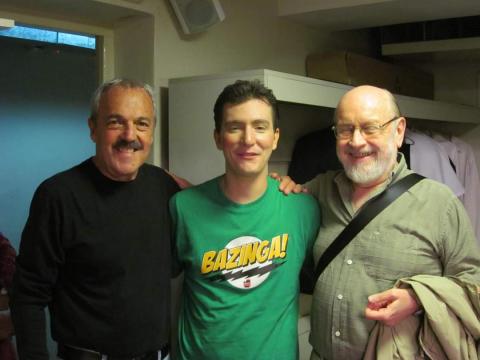
Daniel Rabinovich y Marcos Mundstock de Les Luthiers y Ariel Tarico
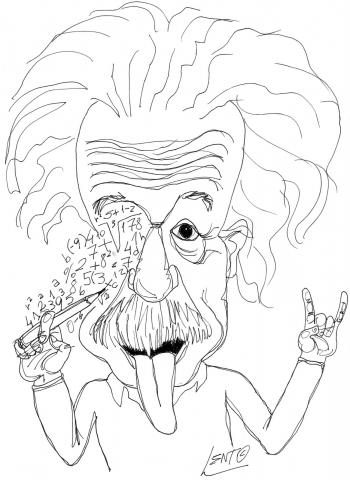
Albert E... Tarico
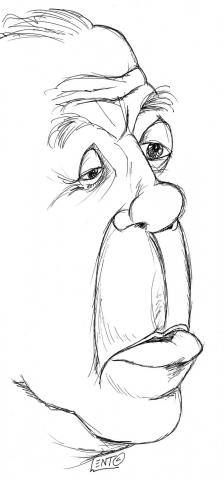
Borges... Tarico
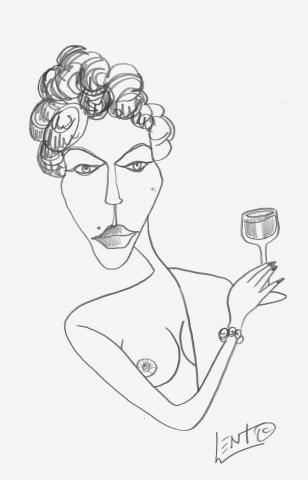
Copa de vino... Tarico
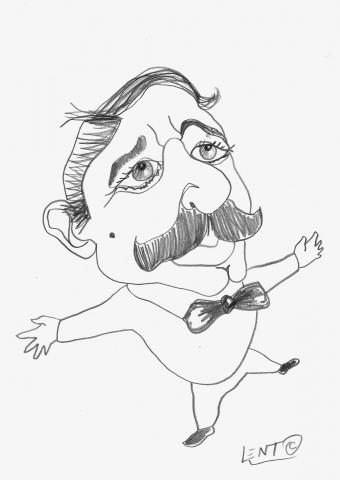
Signore1... Tarico
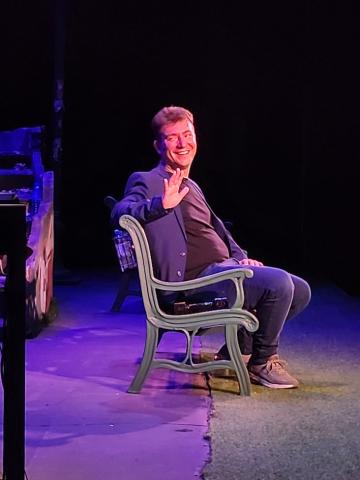
Ariel Tarico
Interview with Ariel Tarico
By Pepe Pelayo
The plague of morality that plagues culture today must be faced with more humor and more satire
There is an Argentine comedian that I know and follow. I am impressed by his spark and sharpness. I already interviewed him a few years ago. It is an honor to do this “dialogue” with Ariel Tarico (Santa Fe, 1984). He is an actor, announcer, comedian caricaturist and imitator. He has obtained a few awards and distinctions such as Four Martín Fierro Awards, Carlos Awards, VOS Awards and Magazine Awards, both for his theatrical and radio work.
Without a doubt, a source of pride for our union.
PP: Dear, as I said, it is an honor to have you here at Humor Sapiens again. I hope you don't suffer too much with the questions. I don't know if you plan to come to Chile, but when you do it would be great to get together to talk over a coffee or a wine and “download” live, do you think?
TARICO: Thank you very much Pepe for considering me, I would love to visit Chile! I hope that wine comes to fruition next year. It will be an honor and a pleasure.
PP. Well, before asking you the first question, I would like you to introduce yourself, in case there are any Humor Sapiens followers who don't know you. And by the way, tell us how you would like to be remembered in the distant future.
TARICO: Like a vulgar comedian.
PP: I hope you used “vulgar” as a synonym for “common.” And now with the direct questions. How did you get started in humor? Did you have a family member or someone close to you who was a comedian, artist?
TARICO: I remember my Father, Juan Carlos, being a big fan of comedians from the 80s, whether graphic or television. I followed everyone who published in the evening newspaper “El Litoral” in Santa Fe: Facta, Sorbellini, Fasola, Periotti, Kovacevic, Izquierdo, Hugo Seri, Gaspardo, Dobal, Lino Palacio. He also made me discover Roberto Fontanarrosa and my aunt Nora lent me the magazine “Humor” by Andrés Cascioli every month, which strongly influenced my training as an artist. It was a time when we watched television as a family: 'Mesa de Noticias' with Juan Carlos Mesa and Gianni Lunadei, 'Badía & Compañía' where my favorite actors appeared: Esteban Mellino who played a character called “Professor Lambetain”, Nito Artaza with the imitations of politicians, Miki Mc Phantom who made all kinds of sounds and Paolo the rocker played by Jorge Montejo. One of my Grandmother Titina's sisters, Aunt Lala, was very funny: she liked to imitate and would dress up to entertain relatives at some gatherings. My Mom Silvia, on the other hand, was more serious and the challenge was to make her laugh.
PP: Well, it seems that your humorous inclination is somewhat justified. My friend, have you evolved in the type of humor you do in terms of form and content? I don't mean that now you have a higher quality product of the experience, because that is obvious. I mean if you have changed your style, interests, etc., from when you started until now.
TARICO: Yes, it was changing. I have to be as forceful as possible in the shortest time possible. The basis continues to be current affairs (politics, sports and entertainment). Now on TV to create the characters we use a new technique: Serrudo makes the caricature of the character that I am going to parody, that is uploaded to a tablet, the viewer captures the gestures of my face and there it comes to life. He is very nice and allows me to make several appearances in a program. There is also a whole team working: Mariano Mena, Sebastián Meléndez, Nicolás Seijas, Caíto Lorenzo and in the scripts (fundamental) Ezequiel Mesa.
PP: The system is very ingenious. You can do wonders with that. Well, I imagine you are already exploiting it well. Dear Ariel, you are an “all-round” comedian, because you imitate, you make humor on stage and in audiovisual media and you even make caricatures! Congratulations. I love comedians like that, “multimedia”. Along those lines I ask you: which of these modalities do you enjoy the most and why? You know that to create humor in theater, on television, on radio, in graphic arts, etc., you must first master the artistic language of that modality and then channel your humor into it. So, which language was easier for you to learn and which was more difficult? And finally, is there any other artistic modality where you would like to do humor, that you haven't done yet?
TARICO: I enjoy the radio more because I was born there as an imitator (LT10 of Santa Fe) and I have more fun, it is a warm and dynamic medium. The most difficult language is that of TV, I'm still learning and I don't feel 100% comfortable. In the future I would like to participate in films or in some fiction, I think that will come with maturity.
PP: Of course, compared to me, you are starting your career and seeing what you have done, you will achieve whatever you set your mind to, without a doubt. Know? I think that being famous in humor, in Argentina, is a huge achievement, because “the competition” is very strong. How do you manage your ego? And also a brief reflection, on whether you always set out to be a renowned comedian or have you been surprised to see yourself like this.
TARICO: I had moments where I was more confident. Artists are very vain and we always wait for thunderous applause or thousands of likes. Now I try to be balanced, the networks where everyone expresses themselves have helped a lot in that and there are times when there are people who don't like what I do and that seems very good to me. Praise makes me more uncomfortable than criticism. I also believe that competition always improves and we must always support new colleagues who emerge. As a child I dreamed of being in the media and being known, so the recognitions I have now are a pampering to continue on the path of producing. Hitting and sometimes failing.
PP: Of course it's a mime. And some advice that you haven't asked me for: don't pay attention to what the networks say. But hey, once you told me an anecdote that I really liked. You told me that in a play you closed with an imitation of Fidel Castro and that when you went down to the audience a Cuban greeted you to congratulate you and thank you because Fidel's voice reminded him of his childhood in Cuba. But on another occasion a person got angry and told you that it was disrespectful to the figure of Fidel and a bad example for young people and that that person was an Argentine. I bring up that story now because I know that many Cubans and Argentinians are fans of Humor Sapiens and will enjoy it. So I ask you to tell us another funny, curious or ingenious anecdote that you have experienced (it does not have to have points of contact with the one I cited).
TARICO: I'll add another anecdote about Fidel Castro. A Spanish spectator came to see me on Corrientes Street and at the end of the show he told me that I was humanizing a dictator. Over time I understood that I was not going to be able to do this satire freely in Cuba. Humor is always a mockery of what is solemn or what is established and tends to make people uncomfortable.
Later I have had much more pleasant moments like when Guillermo Cóppola came to see me at the ND theater, he got on stage to tell anecdotes about Maradona as a duo. I am attaching the link so you can see it and share it.
PP: I saw you in the photo with them. Daniel was one of my best friends. But I won't be sad with the memories. Now is a joyful time, sharing here with you. Do any questions come to mind that you wish I had asked but didn't? If so, can you answer it now?
TARICO: No. The interview was very good.
PP: Thank you. It makes me happy that you liked it. And to close this “dialogue”, can you say a few words to the followers of Humor Sapiens?
TARICO: They laugh despite everything.
PP: My friend, I am truly very happy that you have accepted this exchange, because I know how little time you have. Thanks a million. I wish you good health and continued success!
TARICO: Thank you Pepe, I'm glad you continue creating with so much enthusiasm. Hugs!
PP: Hugs!
(This text has been translated into English by Google Translate)

